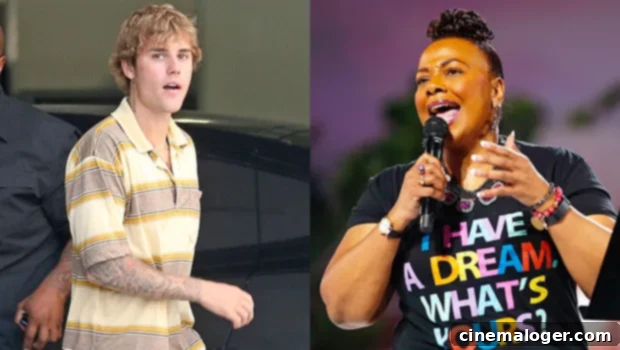Bernice King Praises Justin Bieber’s Support for The King Center Amidst ‘Justice’ Album Controversy
The intersection of pop culture and social activism often sparks intense debate, and a recent instance involving global superstar Justin Bieber and the esteemed legacy of Dr. Martin Luther King Jr. proved no exception. Following the release of his sixth studio album, Justice, which notably featured audio clips from Dr. King’s historic speeches, Bieber found himself at the center of a significant backlash. However, in a pivotal move that redirected the narrative, Bernice King, the youngest daughter of Martin Luther King Jr. and CEO of The King Center, stepped forward not with criticism, but with a public endorsement and expression of gratitude towards the artist.
Bernice King’s support for Justin Bieber emerged amidst a flurry of online discussion and media scrutiny concerning his album’s use of her father’s words. Rather than joining the chorus of voices that questioned the appropriateness or sincerity of Bieber’s artistic choice, King opted to focus on the singer’s subsequent pledge. Bieber announced his commitment to “supporting organizations that embody what justice looks like in action,” with The King Center proudly listed among the beneficiaries. This declaration transformed the conversation, allowing Bernice King to commend Bieber for his philanthropic promise, recognizing the potential for his vast platform to contribute meaningfully to ongoing efforts for social justice.
Each of us, including artists and entertainers, can do something.
Thank you, @justinbieber, for your support, in honor of #Justice, of @TheKingCenter’s work and of our #BeLove campaign, which is a part of our global movement for justice. #MLK #EndRacism https://t.co/nTkR1XdcvW
— Be A King (@BerniceKing) March 18, 2021
On March 18, Bernice King took to Twitter to express her gratitude, tweeting, “Each of us, including artists and entertainers, can do something. Thank you, @justinbieber, for your support, in honor of #Justice, of @TheKingCenter’s work and of our #BeLove campaign, which is a part of our global movement for justice. #MLK #EndRacism.” This tweet, which garnered significant attention, served as a powerful validation from a key custodian of Dr. King’s legacy, shifting the focus from perceived missteps to potential positive impact.
The ‘Justice’ Album and the MLK Audio Controversy
Justin Bieber’s Justice album begins with a potent statement: the voice of Martin Luther King Jr. declaring, “Injustice anywhere is a threat to justice everywhere.” This powerful excerpt is followed by a nearly two-minute track titled “MLK Interlude,” featuring additional snippets from Dr. King’s speeches. The inclusion of such historically significant audio immediately raised eyebrows and ignited a passionate debate among fans, critics, and the broader public.
The primary concern stemmed from the perceived thematic dissonance between the profound social justice message conveyed by Dr. King’s words and the largely pop-oriented, often romantic, content of the rest of the album. Songs like “Holy,” “Hold On,” and “Lonely,” while popular, delve into themes of faith, personal struggle, and his relationship with wife Hailey Baldwin. Many questioned whether the use of MLK’s voice was a genuine attempt to amplify his message or a superficial marketing tactic that risked trivializing his monumental legacy for commercial gain. Critics argued that positioning Dr. King’s powerful call for systemic change within an album predominantly focused on celebrity love and personal angst felt incongruous and potentially disrespectful.

Justin Bieber, however, articulated his intentions behind the album’s title and its conceptual framework. He stated that his goal was to “create a project that provides comfort to the listener, to make songs that people can relate to and connect to, so they feel less alone.” Regarding the samples, he explained, “In the words of Martin Luther King Jr., ‘Injustice anywhere is a threat to justice everywhere.’ My album ‘Justice’ is about my journey and the album name reflects my conviction. I want to continue to be a part of the conversation on how we can do justice.” He acknowledged his privileged position as a white pop star but expressed a desire to use his platform to raise awareness about systemic injustice, portraying his album as a personal and musical exploration of what justice means to him, both individually and collectively.
Bernice King’s Strategic Endorsement and The King Center Partnership
Bernice King’s decision to support Justin Bieber, rather than condemn him, showcased a pragmatic and forward-thinking approach to social advocacy. As the CEO of The King Center, an organization dedicated to preserving Dr. King’s legacy and promoting nonviolent social change, King understands the power of broad appeal and the strategic importance of leveraging influential voices, even those from the pop music world. Her tweet underscored a core belief that social justice is a collective responsibility, asserting that “Each of us, including artists and entertainers, can do something.”
Her endorsement was not a blanket approval of every artistic choice on the album, but a deliberate recognition of Bieber’s pledge to support tangible actions. By highlighting his commitment to “supporting organizations that embody what justice looks like in action,” Bernice King skillfully pivoted the conversation from critique of artistic method to appreciation for philanthropic impact. This move transformed a potential public relations crisis for Bieber into an opportunity for significant support for The King Center and its initiatives.
The King Center’s work, which includes education, community programs, and advocacy for peace and nonviolence, relies heavily on public engagement and financial backing. Bieber’s global reach and massive fanbase represent an invaluable asset in raising awareness and funds for such causes. King’s mention of the #BeLove campaign, a cornerstone of The King Center’s global movement for justice, demonstrates how Bieber’s involvement could directly bolster their ongoing efforts to promote love, compassion, and understanding as foundations for a just society. Her strategic choice emphasized the positive potential of celebrity involvement, reminding the public that allies can be found in unexpected places, and that concrete support for justice-oriented organizations can outweigh initial controversies.
Balancing Personal and Public Justice on ‘Justice’
While the album’s opening prominently features Martin Luther King Jr., much of Justice delves into Justin Bieber’s personal life, particularly his relationship with his wife, Hailey Baldwin. The album is replete with heartfelt odes to his marriage, exploring themes of love, commitment, and personal struggles. Songs like “Holy” are openly about his wife and their shared faith, celebrating their bond. However, it’s tracks like “Unstable” that offer a deeper glimpse into Bieber’s personal journey, presenting a complex interplay between his private challenges and his public artistic statements.
“Unstable,” a collaboration with The Kid LAROI, is a particularly revealing track. Bieber sings about a period in his life where he felt deeply unstable and tried to push Hailey away, yet she remained steadfast. “Sometimes I think I overthink / And I start to feel anxiety / There were times I couldn’t even breathe / But you never once abandoned me,” he confesses. This vulnerability highlights his past struggles with mental health and anxiety, offering a personal narrative of redemption and stability found through love and support.
In an interview with The Sun, Bieber elaborated on the emotional weight of the song: “For me it’s a really emotional song because I was in a really, really bad place maybe a year ago. Fortunately my wife was just there for me through it all and so the whole message of the song is ‘You loved me when I was unstable.’” This candid admission provides crucial context for understanding the personal dimension of “justice” that Bieber explores throughout the album. While seemingly disparate from Dr. King’s call for societal justice, one could argue that personal healing and self-awareness are foundational elements for individuals to engage meaningfully with broader social causes. The album, therefore, attempts to weave together these threads: the personal quest for inner peace and stability, and the outward aspiration for a more just world.
The Broader Discourse on Celebrity Activism
Justin Bieber’s situation reignited the ongoing discussion about celebrity activism and the role of pop culture figures in social justice movements. On one hand, celebrities possess unparalleled platforms, capable of reaching millions and raising awareness for causes that might otherwise go unnoticed. Their endorsements can translate into significant fundraising opportunities and bring diverse audiences into crucial conversations. Bernice King’s decision to embrace Bieber’s support aligns with this perspective, recognizing the strategic value of his influence for The King Center.
However, celebrity involvement is not without its pitfalls. Critics often point to concerns about “performative activism,” where public displays of support lack genuine depth or commitment. There’s also the risk of diluting complex issues or co-opting movements for personal branding or commercial gain, as some initially feared with Bieber’s use of MLK’s audio. The entertainment industry’s commercial nature can sometimes clash with the solemnity and profound significance of historical social justice struggles, leading to accusations of cultural appropriation or superficial engagement. Bernice King’s measured response, focusing on concrete action and partnership rather than abstract intentions, provided a template for navigating these complexities, demonstrating how to harness celebrity influence effectively while upholding the integrity of the cause.
Conclusion: A Path Forward for Justice and Engagement
The episode involving Justin Bieber’s Justice album and Bernice King’s subsequent endorsement serves as a compelling case study in contemporary social engagement. It highlights the inherent tensions and opportunities when powerful historical narratives intersect with modern pop culture. While the initial backlash against Bieber underscored valid concerns about the commercialization and potential trivialization of Dr. Martin Luther King Jr.’s profound message, Bernice King’s strategic response provided a vital redirection. By focusing on Bieber’s pledge to support The King Center and other justice-oriented organizations, she emphasized that tangible action and philanthropic commitment can transcend initial misgivings or artistic controversies.
This collaboration ultimately reinforces the enduring relevance of Dr. King’s legacy and The King Center’s ongoing mission. It demonstrates that the pursuit of justice, in all its forms—personal and societal—requires diverse voices and platforms. Bernice King’s willingness to engage with a global pop icon, despite the complexities, showcases a pragmatic approach to advocacy: leveraging every available resource to advance the cause of peace, equity, and nonviolent social change. As the global movement for justice continues, such partnerships, carefully managed and genuinely committed, will remain crucial in inspiring new generations and sustaining the momentum towards a more just world.
